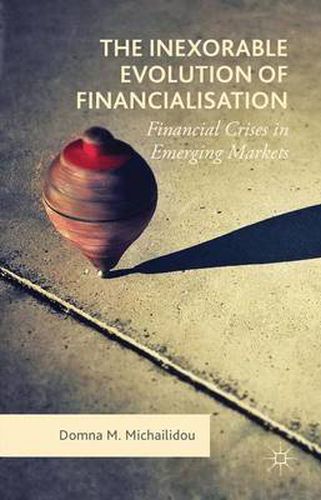Readings Newsletter
Become a Readings Member to make your shopping experience even easier.
Sign in or sign up for free!
You’re not far away from qualifying for FREE standard shipping within Australia
You’ve qualified for FREE standard shipping within Australia
The cart is loading…






This title is printed to order. This book may have been self-published. If so, we cannot guarantee the quality of the content. In the main most books will have gone through the editing process however some may not. We therefore suggest that you be aware of this before ordering this book. If in doubt check either the author or publisher’s details as we are unable to accept any returns unless they are faulty. Please contact us if you have any questions.
Since the 2007 financial crisis, discussion on issues related to the size, spread and frequency of financial crises has captivated a wide variety of audiences. Why has the world economy experienced such a marked increase in financial transactions and private and public indebtedness since the 1980s? How have middle-income developing countries suddenly become a part of this dynamic? And, most importantly, how has the topic of financial crises been featured in households’ daily discussions in both developed and developing parts of the world? Domna Michailidou addresses the questions above through exploring the inexorable evolution of financialisation into financial crisis through the examination of three middle-income countries: Mexico, Brazil and South Korea. Concentrating on emerging economies, and especially choosing three very different economies that all experienced financial crises in the 1990s, this book explores what lessons can be learnt regarding financial fragility, volatility and failure in the wake of capital market liberalisation.
$9.00 standard shipping within Australia
FREE standard shipping within Australia for orders over $100.00
Express & International shipping calculated at checkout
This title is printed to order. This book may have been self-published. If so, we cannot guarantee the quality of the content. In the main most books will have gone through the editing process however some may not. We therefore suggest that you be aware of this before ordering this book. If in doubt check either the author or publisher’s details as we are unable to accept any returns unless they are faulty. Please contact us if you have any questions.
Since the 2007 financial crisis, discussion on issues related to the size, spread and frequency of financial crises has captivated a wide variety of audiences. Why has the world economy experienced such a marked increase in financial transactions and private and public indebtedness since the 1980s? How have middle-income developing countries suddenly become a part of this dynamic? And, most importantly, how has the topic of financial crises been featured in households’ daily discussions in both developed and developing parts of the world? Domna Michailidou addresses the questions above through exploring the inexorable evolution of financialisation into financial crisis through the examination of three middle-income countries: Mexico, Brazil and South Korea. Concentrating on emerging economies, and especially choosing three very different economies that all experienced financial crises in the 1990s, this book explores what lessons can be learnt regarding financial fragility, volatility and failure in the wake of capital market liberalisation.